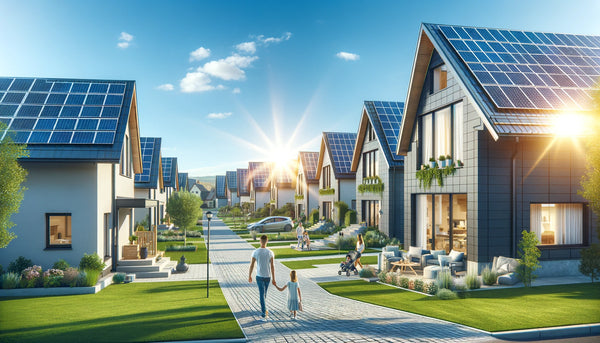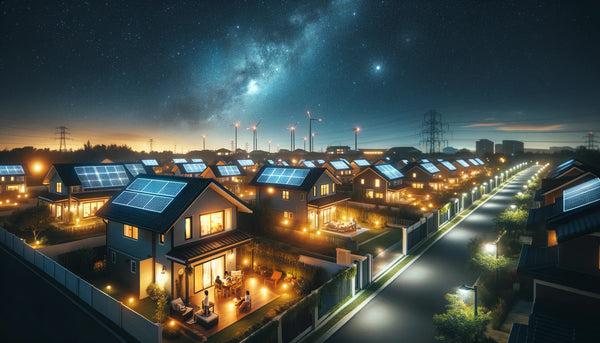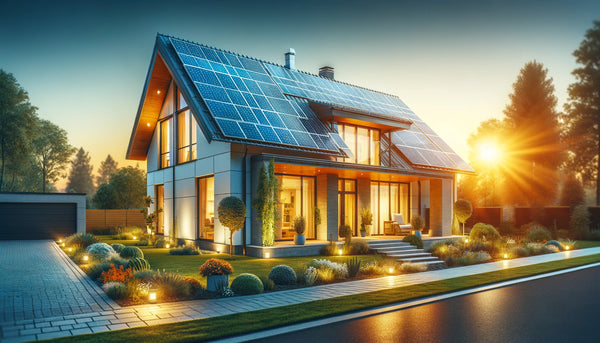In recent years, there has been a significant surge in the adoption of solar energy among homeowners. This trend marks a pivotal shift towards sustainable and renewable energy sources. With concerns over climate change mounting and the desire to reduce dependence on fossil fuels, more and more households are embracing solar panels as a viable alternative. In this article, we delve into the reasons behind the rise of solar energy and why homeowners are increasingly choosing to invest in solar power systems.
Table Of Content
- Environmental Consciousness
- Financial Benefits
- Energy Independence
- Technological Advancements
- Increasing Property Value
- Conclusion
- FAQs

Environmental Consciousness
One of the primary drivers behind the growing popularity of solar panels among homeowners is an increased awareness of environmental issues. Climate change, pollution, and the depletion of natural resources have prompted many individuals to seek eco-friendly solutions for their energy needs. Solar energy offers a clean and renewable alternative to traditional electricity generation methods, emitting no greenhouse gases or harmful pollutants during operation. By harnessing the power of sunlight, homeowners can significantly reduce their carbon footprint and contribute to a more sustainable future for generations to come.
Financial Benefits
Another compelling reason for the uptick in solar panel installations is the financial savings they offer to homeowners. While the initial investment may seem daunting, solar energy systems can lead to substantial long-term cost reductions. With advancements in technology and decreasing installation costs, solar panels have become more affordable and accessible to the average homeowner. Additionally, many governments and utility companies offer incentives, such as tax credits and rebates, to encourage the adoption of solar energy. By generating their electricity through solar panels, homeowners can offset or even eliminate their monthly electricity bills, providing a significant return on investment over time.
Energy Independence
The desire for energy independence is also driving homeowners to embrace solar power. By generating their electricity onsite, homeowners are less reliant on external energy providers and vulnerable to fluctuations in utility prices. Solar panels enable individuals to take control of their energy production and consumption, reducing their dependence on the traditional grid. This independence not only provides greater stability and security but also insulates homeowners from the volatility of fossil fuel markets. As energy storage technology continues to improve, homeowners can store excess solar energy for use during periods of low sunlight or grid outages, further enhancing their autonomy.

Technological Advancements
Advancements in solar technology have played a crucial role in driving the adoption of solar panels among homeowners. Over the years, solar photovoltaic (PV) panels have become more efficient, durable, and aesthetically pleasing. Innovations such as thin-film solar cells, bifacial panels, and smart inverters have enhanced the performance and versatility of solar energy systems. Additionally, the integration of solar panels with home automation systems allows homeowners to monitor and manage their energy usage more effectively. These technological advancements have made solar energy an attractive option for homeowners looking to reduce their environmental impact without sacrificing convenience or comfort.
Increasing Property Value
Installing solar panels can also boost the value of residential properties. Studies have shown that homes equipped with solar energy systems tend to sell faster and at a higher price than comparable properties without solar panels. Prospective buyers are increasingly prioritizing energy efficiency and sustainability when searching for a home, making solar panels a desirable feature. Additionally, solar-powered homes typically have lower utility bills, making them more affordable to own and operate over the long term. As a result, investing in solar panels can provide homeowners with a significant return on investment when it comes time to sell their property.
Conclusion
The rise of solar energy represents a significant shift in how homeowners meet their energy needs. Driven by environmental concerns, financial incentives, and technological advancements, more and more households are turning to solar panels as a sustainable and cost-effective energy solution. By harnessing the power of sunlight, homeowners can reduce their carbon footprint, lower their energy bills, and increase the value of their properties. As the demand for clean energy continues to grow, solar power is poised to play an increasingly prominent role in shaping the future of residential energy production.

FAQs
Are solar panels suitable for all homes?
Solar panels can be installed on most residential properties, but factors such as roof orientation, shading, and local regulations can affect their suitability. A professional assessment can determine the feasibility of solar panel installation for your home.
What are the financial benefits of installing solar panels?
Installing solar panels can lead to significant long-term cost savings by reducing or eliminating monthly electricity bills. Additionally, homeowners may qualify for incentives such as tax credits, rebates, and net metering programs.
How do solar panels contribute to environmental sustainability?
Solar panels generate electricity without emitting greenhouse gases or other pollutants, making them a clean and renewable energy source. By reducing reliance on fossil fuels, solar energy helps mitigate climate change and preserve natural resources.
How do technological advancements impact solar energy systems?
Advances in solar technology have led to more efficient, durable, and aesthetically pleasing solar panels. Innovations such as smart inverters and energy storage solutions enhance the performance and versatility of solar energy systems.
You May Also Like
- Solar Panels and Net Metering: Maximizing Your Solar Investment
- A Buyer’s Guide To Used Solar Panels
- The Unbelievable Solar Panels that Work at Night
- Are Solar Panels Worth It? (Professional Guide)
- The Economics of Solar Panels: ROI and Savings

